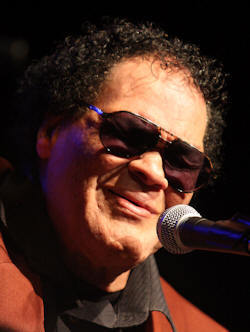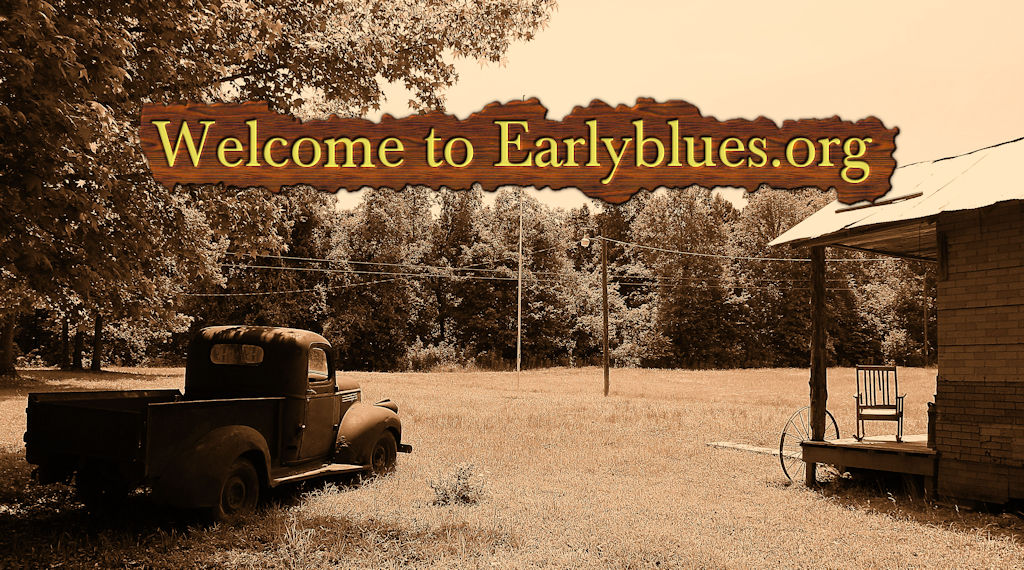‘Louisiana Red Obituary’ – by Keith Woods, from Tales From The Woods
 Tales From The Woods raises a glass and says farewell to Blues guitarist and singer Louisiana Red who passed away on 25th February in Hanover, Germany where he had made his home for a number of years, aged 79.
Tales From The Woods raises a glass and says farewell to Blues guitarist and singer Louisiana Red who passed away on 25th February in Hanover, Germany where he had made his home for a number of years, aged 79.
“My life is the blues and it’s all I know.” An often used quote from this slide guitarist of note and singer of depth and passion of few comparisons even in the field of his chosen path, the music of the delta blues, Red had more reason than any man should have to sing the blues. As a baby in arms, his Grandfather died suddenly; his mother following the coffin caught a chill that quickly developed into pneumonia which would soon take her life too. At age five he was orphaned after his father was lynched by the Ku Klux Klan. The crime was never investigated. Many years later, after Red had found acclaim and a certain amount of well-deserved fame, a well-meaning fan and blues researcher obtained a copy of the death certificate which he gave to Red. However it upset him greatly and reopened old emotional wounds. Hardly surprising given the circumstances that, as a boy into a youth, Red manifested a growing hatred of white people that would remain with him until music finally changed his life.
He moved around from relative to relative including a period spent in New Orleans with an uncle that brutally beat him at a whim and without mercy, spells in an orphanage and as adulthood beckoned he spent time in prison.
Born Iverson Minter at Bessemer Alabama on 23 March 1932, it was whilst picking cotton as an 11 year old that he found himself befriended by an older man who taught him the rudiments of playing a guitar. Seemingly knowing by instinct that there were not going to be many avenues out of the misery that life had offered so far, he found an escape through music, in particular the Blues he heard all around him; from the fields, emanating from the honky tonks and bars and no doubt coming out of the radio. It was not too long after being released from prison around 1949 that he joined the band of John Lee Hooker. A side recorded by Hooker is by all accounts a tribute to him, Good Rockin’ Red.
Muddy Waters entered his life come 1952 on a trip to Chicago and on Muddy’s recommendation, he entered into Chess studios to record as Rocky Fuller, a name that provided a function for the remainder of the decade with only a modicum of success. The odd pseudonyms that cropped up spasmodically altered little before finally settling on Louisiana Red, it is said based on his affection for Louisiana hot sauce. As the fifties gave way to the sixties a track he recorded did quite well for him, I Done Woke Up, which was not, as the title might suggest to modern ears, a pastiche of the blues but a rather ahead of its time plea for racial and political harmony. 1963 would see the first LP under his name recorded Lowdown Back Porch Blues, another followed in quick succession Seventh Son, a single I’m Too Poor To Die very much in the style of Muddy Waters found its way on to the lower regions of America’s billboard charts, no doubt helped by the arrival of the Rolling Stones which opened American consciousness to the sounds in their own back yard. Another offering I’m Louisiana Red described his period spent on the road with John Lee Hooker.
Red would write and record a couple of songs about his first wife whom he met in 1963 Sweet Alesse and Two Fifty Three that recalled the time of their first meeting. However, as so often in his life so far, tragedy would strike him down when she died of cancer ten years later, but not before bearing him three children and the comforts of a nice home on farmland in the state of Florida. Her passing produced the harrowing Death Of Alesse which he often performed with gut-wrenching emotion in concert. An appearance at the Montreux Blues Festival took him from being just another journeyman blues musician to that of an acclaimed slide guitarist with a powerfully emotional voice.
He married a second time in 1977 to blues singer Odetta Gordon and set up home in the city of Hamburg. Several highly regarded albums saw the light of day as the years progressed including Blues Sinanta To Rembetiko [1988] which was a somewhat off the wall experiment of adding exotic instruments to interpret the blues, followed by a more expected but still eclectic A Different Shade Of Red [2002] while 2008 saw the release of Back To The Black Bayou and as recently as 2011 Memphis Mojo. Curtailed in recent years by erratic health he had been up to then a regular touring performer in both Europe and his native United States. Once a year in company of Odetta he would make a trip to Ghana where he would both work and perform for under privileged children.
I was lucky enough to witness his often passionate and depth defying interpretations of his own material and that of others at gigs back in the nineties at London’s legendary 100 Club, also just inside this present century at the Orchard Theatre, Dartford, Kent. Leaving the last word with Red in the same way as we came in “The Blues Is Deep Inside, It Will Always Be There” .
Keith Woods
Wikipedia Entry:
Iverson Minter (March 23, 1932 – February 25, 2012), known as Louisiana Red, was an African-American blues guitarist, harmonica player, and singer, who recorded more than 50 albums. He was best known for his song “Sweet Blood Call”.
Born in Bessemer, Alabama, Minter lost his parents early in life; his mother died of pneumonia shortly after his birth, and his father was lynched by the Ku Klux Klan in 1937. He was brought up by a series of relatives in various towns and cities. Red recorded for Chess in 1949, before joining the Army. He was trained as a parachutist with the 82nd Airborne and was sent to Korea in 1951. The 82nd Airborne was not deployed as a complete unit in Korea, but soldiers from this unit were dispatched as Rangers in the 2nd, 3rd and 7th Infantry Divisions. Minter said he was assigned to the 3rd Infantry Division.
After leaving the Army, he played with John Lee Hooker in Detroit for two years in the late 1950s. He recorded for Checker Records in 1952, billed as Rocky Fuller.
His first album, Lowdown Back Porch Blues, was recorded in New York with Tommy Tucker and released in 1963. His second album, Seventh Son, was released later the same year. Louisiana Red released the single “I’m Too Poor to Die” for the Glover label in 1964. It peaked at number 117 on the Billboard Hot 100 and number 30 on the Cashbox chart. (Billboard did not publish an R&B chart in 1964.)
He maintained a busy recording and performing schedule through the 1960s and 1970s, working in sessions for Chess, Checker, Atlas, Glover, Roulette, L&R and Tomato, amongst others. In 1983 he won a W. C. Handy Award for Best Traditional Blues Male Artist. He lived in Hanover, Germany, from 1981.
He appeared in the films Rockpalast (1976), Comeback (1982), Ballhaus Barmbek (1988), Red and Blues (2005) and Family Meeting (2008).
In 1994, Louisiana Red fused the blues with the urban Greek music of the bouzouki player Stelios Vamvakaris, on the album Blues Meets Rembetika. He continued to tour, including regular returns to the United States, until his death. In 2011, Louisiana Red released the album Memphis Mojo, to broad public acclaim.
Michael Messer noted on February 25, 2012, “I am very sorry to be bringer of such sad news that my dear friend, Louisiana Red, died this morning. He had a stroke on Monday and had been in a coma.” He died in Hanover, aged 79.
Further references:
Earlyblues/BBC interview with Louisiana Red – interviewed in 2009 – Red: “I enjoyed you gentlemen, I rarely do inteviews”.
UK tour photos 2009 – with Micheal Messer and guest Lucy Zirins
Images © copyright 2009 Alan White. All rights reserved.


